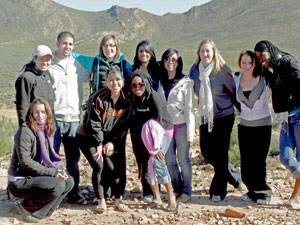Now is the time when parents ask their high school and college-aged kids, “What do you plan on doing with your summer?”
Instead of choosing to spend their summers lifeguarding or in an unfulfilling office internship, students are opting to spend their summers making a difference in the global community by volunteering abroad. Projects Abroad, a leading international volunteer placement organization, offers a wide variety of summer internship opportunities and special two-week high school programs in developing countries around the world.
An ideal option for college students – those who have decided on a course of study and those who haven’t – is our summer internship programs. Most projects require no prior background in the field, and offer students a valuable cross-cultural learning experience that will not only leave them with lasting memories, but will also beef up their resumes and attract future employers.
Summer Internships
Projects Abroad offers more than ten types of summer internships in disciplines like medicine, journalism, law and human rights, business and veterinary medicine, in over 20 locations on five continents.
The Medicine and Healthcare internship is a great choice for students interested in pursuing a career in general medicine, physical therapy, midwifery, dentistry, nursing, occupational therapy and speech therapy. Interns work closely with doctors and medical staff in hospitals and clinics, and are considered to be very valuable assets, especially because resources in developing countries can be somewhat inadequate.
Depending on the project they choose, our medical interns typically all have a slightly different experience. Take dentistry internships for example. Our volunteers in India work in clinics in and around the city of Madurai, while interns in Argentina are placed in a large hospital in Villa Allende, and interns in Mexico work in smaller dental practices in Guadalajara. Regardless of the placement though, we welcome interns of all qualification levels – from high school students and medical school students to skilled professionals.
Another popular option for students is our Business internships. They are ideal for anyone looking to acquire hands-on experience and professional skills in an international business setting. We know that our interns come to us in all different stages of their professional careers, which is why we tailor business internships to suit the individual, since skills, prior experience, and personal interests are directly relevant to the placement. The positions in this field vary, but all offer challenging and fulfilling work experience in the business sector. Just as with the medicine internships, each business placement has a unique work setting and requires a certain skill set from volunteers. Volunteers with business internships in Shanghai, Madurai, Chisinau, Ulaanbaatar and Cape Town may work in a high rise building with all of the latest technologies, or be placed in a smaller company that operates without large resources.
Volunteer projects
Though our internships are offered to volunteers of all levels, high school students ages 16-19 may find a two-week summer special to be a more viable option. We created the two-week summer projects especially for this age group that combine full-time project with an enjoyable half-way point weekend excursion. These exciting projects involve students working with their peers in the fields of Archaeology, Care & Community, Diving & Marine Conservation, and more. Many parents are interested to know that select two-week specials may provide escorted flights from New York – JFK with a Projects Abroad staff member.
Our Inca & Archaeology Project in Peru is a once-in-a-lifetime experience. Volunteers work outdoors in the beautiful Andes Mountains and help with archaeological activities and community work. On the weekend, they make a special trip to see Machu Picchu and other world-famous sites. Across the world in Nepal at our Care & Community Project, students work in an area rich in ancient temples, culture, and tradition. Students spend two weeks working in an orphanage or school, playing with children and helping to renovate and decorate buildings. Just as exciting as the others, our Diving & Marine Conservation Project in Thailand allows students to observe the stunning coral reef, assess its damage and help conserve the ecosystem. There are over 40 options to choose from in total in 22 destinations.
With the exception of the two-week high school summer specials, all of Projects Abroad’s programs offer volunteers the flexibility of choosing a start and end date. Our staff prides themselves on the quality of service we offer volunteers from the moment they call until the end of their trip and beyond. Our volunteers (and parents of volunteers) can rest assured that each of the countries we work in has at least one Projects Abroad office with full-time employees who are trained in our head office.
********
This guest post was contributed by Thomas Pastorius, Jr. Our website offers a ton of great information on all of our projects, costs, safety and more. www.projects-abroad.org.


